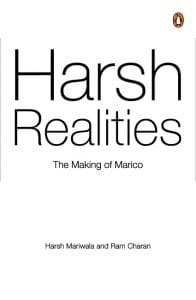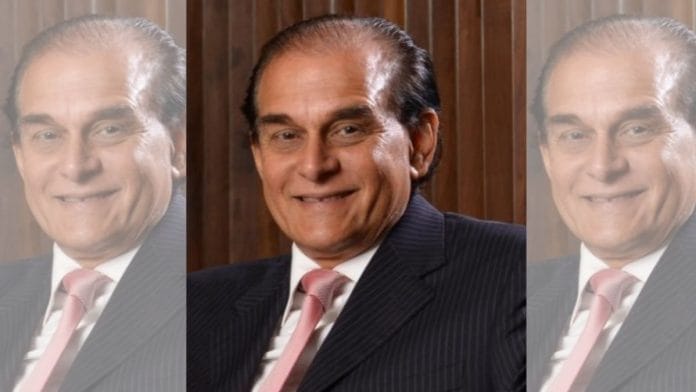The Mariwala family had stayed together, parents with children, siblings with siblings in the same mansion through generations. Their ancestors and fathers had sagaciously held the family wealth and assets in legally bound and registered cross-holding companies, much as many other business families did, in that era. They had followed the practice of crossholdings to ensure that the future generations would continue to stay together. Under the circumstances, a family break-up was very difficult, and any division of wealth could happen only via mutual agreement.
So it happened in one of the quarterly meetings in 1992 that disturbing information surfaced about one of the jointly owned businesses losing much more money than was disclosed. As would be natural, it created doubts in the others’ minds. The family charter, set up in 1990, had created a framework for transparency, but the arrangement seemed to have unravelled. Family members were extremely rattled at this breach of trust. If those responsible for running the various companies in the group could not be trusted, the very basis of the business restructuring exercise stood threatened and was in danger of coming apart at the seams.
Negotiations and Mediation
The quest for separate ownership saw Harsh enter into negotiations with one branch of the family to buy out their interests in Marico. As Marico was the most highly valued company in the group, any exchange of shares meant that Harsh would have to pay a very heavy consideration. Harsh learnt that he had the backing and innate trust of his uncle Kishore, who told him to also negotiate on his behalf. Through the years 1992–94, negotiations among the family members continued. With multiple family members being involved in negotiations over the various businesses and other assets such as real estate properties, the process became extremely complex. Each asset had to be listed and a fair value arrived at. The only way in which this issue could be resolved would be through the mediation efforts of an external person that all trusted.
Two years of negotiations, and an agreement on Marico’s valuation still wasn’t forthcoming. Finally, the family decided to appoint a reputed third-party valuer, Y.H. Malegam. An Agreement was signed whereby Harsh and his uncle Kishore were given eighteen months to buy out the shares of the other two families at a valuation determined by the third party. Till which time, they would place their own shares in escrow as security.
In May 1994, Malegam was ready with the valuation. A family meeting was called at the Belvedere Club located in The Oberoi Hotel, Bombay. Based on his enquiries with some finance experts, Harsh had a rough sense of how much the business was worth. However, when the third-party assessment came in at double the value he had anticipated, he was stunned. When he heard the figure, blood drained from his face.
Now, basis the very attractive valuation, the second branch of the family also decided to sell their Marico shares. This meant doubling the cost that Harsh and Kishore would have to pay in a short time frame. Both debated at length about whether such payments would be within their reach. Ultimately, they determined that, though risky, it made eminent business sense to acquire the shares of the second branch as well. They agreed that Harsh would continue as MD of Marico while Kishore Mariwala’s family would serve as joint promoters without any active involvement in the business.
Also Read: Running a family business? Here are 4 ways you can help the economy recover from Covid
Bankrolling the Buy-Out
Harsh was between a rock and a hard place. He had barely put together a strategy to raise funds for what he imagined would be the anticipated valuation—which by itself was a big stretch. Now having to raise twice the funds was a task for which he had neither a plan nor the wherewithal . . . And the clock was ticking. With shares in escrow, if Harsh and his uncle Kishore were unable to come up with the funds in time, they risked losing the company.
Once again, Harsh turned to someone trusted to seek guidance and counsel. Harsh asked Uday Kotak, his friend and founding partner of Kotak bank, whether his bank would lend the funds needed to settle the family deal. He emphasized that he was not requesting a favour based on family ties and would pledge his shares as well as those of his uncle Kishore as collateral. As they talked, Kotak noticed the physical toll that the separation process had taken on Harsh. Kotak knew that many other family businesses faced the same difficult process of disentanglement— and quite a few had handled the separations badly. Often, decision[1]making bordered less on rationality and more on what the opposing party would receive. Said Uday later, ‘I must give credit to Harsh for his maturity. The Mariwala separation went better than a lot of family business experiences I have witnessed.’ A statement which emphasized the professional and open approach that Harsh brought to the situation. Along with Uday Kotak, Harsh also approached Sajjan Jindal for bailing him out by loaning funds. Cognizant of Harsh’s integrity, Sajjan agreed without hesitation to stand by him. Again, as with the bank, the shares stood as collateral.
Also Read: Entrepreneurs who turned their silver spoons gold
Taking the Bull by the Horns
Another route that Harsh and Pranab discussed was to take Marico public, something they would have liked to execute much later, at a better time and not with a gun to the head. When they broached the idea with merchant bankers, they were advised that the capital markets were not conducive to announcing an initial public offering (IPO)— and at their expected valuation.
The conversations with Kotak convinced Harsh that the time was ripe to take the plunge and take Marico public, even if it meant risking a lower valuation. Harsh held extensive meetings with potential buyers, merchant bankers and FIIs, both in India as well as abroad. He decided to sell a part of his own and his uncle Kishore’s shareholdings alongside the IPO. In March 1996, Kotak and Enam helped create a listing, and took Marico to the public market at what was considered a very high valuation. In a bearish market, the Marico share was priced at a premium of `165 (US$2.35 in 2019) per share on a face value of `10 (15 cents in 2019) per share.
In a little over a nail-biting twenty-four hours, jubilation ensued. The public issue met with a rousing response: it was over-subscribed. Harsh’s joy knew no bounds. He stood vindicated. All those years of unacknowledged, unrecognized efforts, tireless toil, followed by the mountain of debt, were absolved in one fell swoop. Harsh had surmounted all his obstacles. And now stood tall with the faith the public had reposed in him.
It was a simultaneous offer for sale by the promoters and an IPO by the company. The families of Harsh and Kishore sold shares worth `46 crore (US$6.6 million in 2019) and Marico raised fresh equity capital of `17.5 crore (US$2.5 million in 2019). Harsh had solved his personal debt problem and also infused some funds into Marico which were then deployed to ease working capital pressures. After the IPO, Harsh and Kishore’s family together owned roughly 65 per cent of Marico stock. At the same time, his sense of fair play was gratified that the other two branches of the family received more than a fair valuation.
Post-IPO, in 1996, Marico’s market capitalization was `236 crore (US$34 million in 2019). By mid-2020, the market capitalization had multiplied 190 times.
Although onerous at the time, buying out the other branches of the family proved to be not just a worthwhile decision financially, but also one where he was finally master of his own destiny.
FINALLY.
One Journey Ended.
Another began.
 This excerpt from ‘Harsh Realities: The Making of Marico’ by Harsh Mariwala and Ram Charan has been published with permission from Penguin Random House.
This excerpt from ‘Harsh Realities: The Making of Marico’ by Harsh Mariwala and Ram Charan has been published with permission from Penguin Random House.






